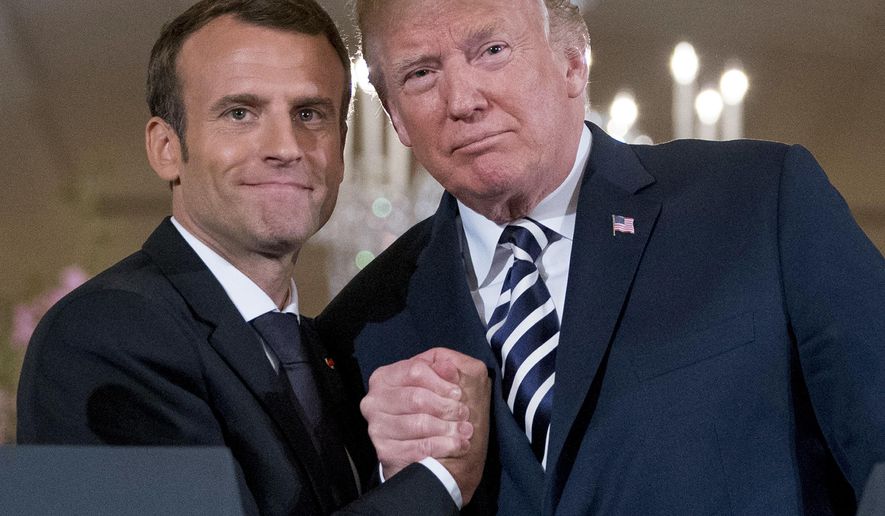PARIS (AP) - For over a year, French President Emmanuel Macron has cajoled his counterpart Donald Trump, convinced he could make him change his thinking on climate change, the Iran nuclear deal and world trade. But the 40-year-old leader acknowledged this week it didn’t work, and instead said he was focusing his efforts on European partners.
“The partner with whom Europe had built the order of post-war multilateralism seems to turn his back on this common history,” Macron said Monday in an annual speech to French diplomats.
For the first time since his election in May 2017, Macron appeared about to give up hope about influencing the 72-year-old U.S. president - what his aides often called “a work of conviction.”
The turning point might have been last month’s contentious NATO summit in which Trump assailed allies for not spending enough on defense.
A few days after, Macron met with Putin in Moscow. His office said he wanted to make Europe’s voice heard.
Just a month before the NATO summit, Trump had already roiled the weekend Group of Seven meeting in Canada by agreeing to a joint statement on trade, only to withdraw from it while flying to Asia.
Macron listed on Monday the American policies on which he tried, in vain, to persuade Trump to change, listing his “doubts on NATO, aggressive and unilateral trade… the withdrawal from the Paris (climate) agreement, the exit from the Iranian nuclear deal.”
Francois Heisbourg, a former French government adviser and chairman of the International Institute for Strategic Studies, noted an “obvious change in tone” from the French president. He said that Macron had acknowledged that “since friendship doesn’t seem to be a language that works, he will do differently.”
Yet the French leader remains a man of dialogue, Heisbourg stressed, comparing him to a “horse whisperer,” for his at least earlier ability to rouse smiles in Trump.
In Macron’s mind, Trump has joined more wild horses like Russian and Turkish counterparts Vladimir Putin and Recep Tayyip Erdogan, Heisbourg said.
Macron and Trump’s friendship really started in Paris on Bastille Day last year, when Trump, the guest of honor, enjoyed so much the military parade on the Champs-Elysees Avenue that he said he wanted to stage a similar one in Washington.
The U.S. president reserved for his French counterpart the first state visit under his presidency in April. They showered each other with praise, made jokes, handshakes and even cheek kisses.
Both men still seem keen to keep their warm relationship despite their disagreement on some fundamental issues.
White House spokeswoman Sarah Huckabee Sanders said Tuesday that “the two leaders consult frequently on a wide range of global challenges. The president looks forward to continuing to work closely with President Macron to advance our shared economic and security interests.”
The two leaders last chatted on Aug. 11 about Syria, Iran, the Middle East and trade. Trump tweeted that he “had a very good phone call” with Macron.
The same day, Macron also talked with Putin.
Macron and Trump are now scheduled to meet on Nov. 11 for the commemoration of the end of World War I in Paris, where the U.S. president has said he would attend.
Macron hopes to seize the occasion to discuss global trade relations with other world leaders who have been invited.
“I think we shouldn’t give in to one’s hegemony and everyone’s division,” he said in another blow to Trump’s tariffs hike policies.
Meanwhile, Macron is looking for support for his proposals toward a more integrated European Union, with a common security doctrine and a shared budget for countries using the euro.
On Thursday, Macron was on the third day of a trip to Denmark and Finland. He plans to meet with counterparts from Belgium, Luxembourg and the Netherlands next week. After that, he is scheduled to host German Chancellor Angela Merkel in Paris.
Macron wants Europe to lead the way toward more multilateralism, as opposed to isolationism, to address the worlds’ challenges like migration, climate change, digital transformation and inequalities.
“The real question is not so much to know if I will take Donald Trump by the arm during the next summit but how we will collectively get to grips with this moment of great transformation we are going through,” he said Monday.
___
AP White House reporter Zeke Miller contributed to this story.




Please read our comment policy before commenting.